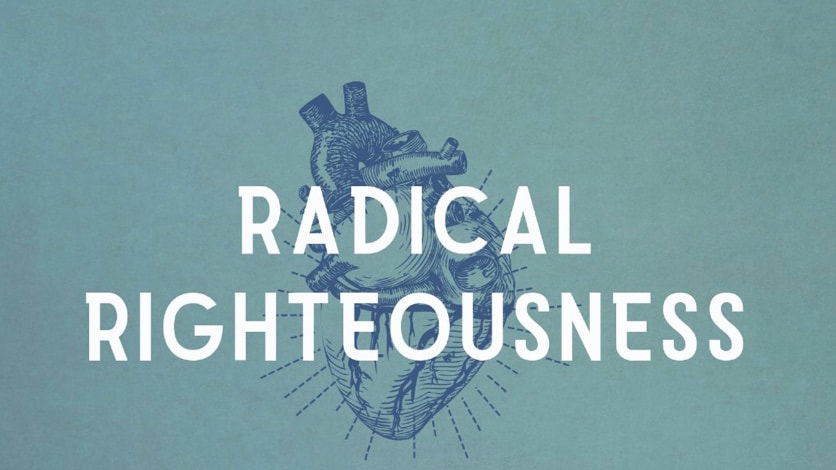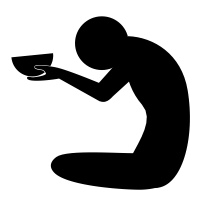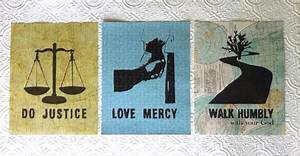| In the middle of the Sermon on the Mount, Jesus addresses our anxiety about basic needs. He says not to worry about food or clothing because God has a plan to provide for us just like he does for the birds and the flowers (see Matthew 6:25-32). Then Jesus tells us where to put our focus: “But seek first the kingdom of God and His righteousness, and all these things will be added to you” (Matthew 6:33). | |
In the past generation, the command “seek first the kingdom of God and His righteousness” has been defined as an individual’s pursuit of a personal relationship with God above all else. But we need to be careful not to read our trendy assumptions into the text. We need to suspend our contemporary interest in romanticized, individualistic spirituality and make sure we pay attention to what Jesus meant.
Jesus did not give a general command to “seek God personally.” He didn’t elevate individual intimacy with God above all else. His words specifically tell us to go after “the kingdom“ and “His righteousness.” Those two parallel direct objects of the verb “seek” are where we should focus. God had been planning to establish his kingdom and his righteousness on earth for a long time. And he had a very specific vision for what those things would look like.
Jesus makes reference to the kingdom over 100 times in Matthew, Mark, and Luke. His basic message everywhere he went was: “The kingdom of God has arrived!” (Matthew 3:2; Mark 1:15). He taught his disciples to proclaim its arrival everywhere they went (see Matthew 10:7). But what exactly did the arrival of God’s kingdom look like?
God’s kingdom was not going to arrive like or look like other political kingdoms (see Luke 17:20; John 18:36). His kingdom did not pursue political power. Because it functioned differently. So Jesus had to use analogies to describe the kingdom‘s inconspicuous and surprising expansion (Matthew 13; Mark 4; Luke 13; Luke 17:21). His parables of the kingdom describe a mix of authentic followers who embrace it, and impostors who have to be weeded out of the community.
Participation in the kingdom is greatly affected by one’s wealth and status in this world. Jesus said it would be hard for wealthy people to join (Matthew 19:23; Mark 10:23) because the worries of this world make them unreceptive (Mark 4:19). However, the poor, the crippled, the blind, the lame, despised prostitutes, and hated tax collectors are more receptive to it (Matthew 21:31; Luke 14:21). As Jesus said in his first beatitude, “Blessed are the poor, for yours is the kingdom of God” (Luke 6:20). People struggling in poverty embrace the kingdom because it’s a place where people burdened by debt are mercifully forgiven of what they owe (Matthew 18:23). They are rescued out of their poverty.
What does it take to join God’s kingdom? Matthew 7:21 says, “Not everyone who says to Me, ‘Lord, Lord,’ will enter the kingdom of heaven, but he who does the will of My Father who is in heaven will enter.” You join the kingdom when you start living the way God told us to. If you don’t get on board with everything the Father wants, then you can’t join. These instructions line up perfectly with the Lord’s Prayer. “Your kingdom come; your will be done, on earth as it is in heaven.” The first two parallel lines show us that God’s kingdom comes when we do God’s will. The kingdom is found everywhere people are living the way God wants us to live.
But how did God tell us to live? That’s where Jesus’ parallel expressions in Matthew 6:33 become of central importance. The kingdom way is defined by “His righteousness.” Just like God said when Abraham was beginning a lineage of faithful followers in Genesis 18:19. “I have chosen him so that he may command his children and his household after him to keep the way of the Lord by doing righteousness and justice.” Righteousness and justice are central to God’s centuries-old way for people to live in community on earth.
The noun “righteousness” occurs seven times in Matthew (3:15; 5:6, 10, 20; 6:1, 33; 21:32), once in Luke, and not at all in Mark’s Gospel. Matthew is the only synoptic Gospel in which Jesus speaks the word “righteousness.” These facts reveal how special this language is to Matthew’s Gospel. Righteousness was its defining characteristic of God’s kingdom, and we need to understand what it referred to if we are to know what Jesus commanded us to “seek” in Matthew 6:33.
The first place for us to define “righteousness” in Matthew’s Gospel is the Sermon on the Mount. Five of the seven times Matthew uses “righteousness” are found in chapters five and six of that Sermon. Jesus first tells us that people who “hunger and thirst for righteousness” are blessed (5:6). That promise sounds remarkably similar to Matthew 6:33 where basic needs are guaranteed to those who seek it. But what kind of righteousness are we supposed to pursue?
Before Jesus defines it, he reiterates how profoundly important it is in his kingdom. “For I say to you that unless your righteousness surpasses that of the scribes and Pharisees, you will not enter the kingdom of heaven” (Matthew 5:20). The scribes and the Pharisees were the most meticulous rule followers in Jesus’ time. So what kind of righteousness could exceed their disciplined lifestyle?
The rest of the Sermon on the Mount from Matthew 5:21-7:27 defines the excessive “righteousness” in the kingdom of heaven. The highlights include:
- Reconciliation: Don’t hold anger in your heart against someone (5:21-26)
- Sexual purity: Don’t look lustfully at women (5:27–30)
- Integrity: Stand by your word (5:33-37)
- Magnanimous Love: Care for your enemy not just your friends (5:38-47)
- Authenticity: Don’t do good things to impress people (6:1)
- Charity: Humbly give to people in poverty (6:2-4)
- Prayer: Talk to God privately (6:5-13)
- Forgiveness: Forgive others so God will forgive you (6:14-15)
- Financial Prudence: Don’t amass excess wealth on earth (6:19–21, 24)
- Self-Reflective Discernment: Don’t assume others’ bad motives and fix your own junk first (7:1-5)
- Golden Rule: Treat people the way you want them to treat you (7:12)
- Active Obedience: Do everything Jesus taught (7:15-27)
All these practices define what God’s righteousness looks like on earth. They are virtues practiced in community that reveal how passionate Jesus is about our horizontal relationships. He wants us to treat people the right way, not just have a good individual experience with God. This kind of righteousness is not a state of being innocent but a way of living. That fact becomes clear when the Sermon climaxes with a parable that celebrates “everyone who hears these words of mine and acts on them” (7:24). Doing the right thing by God’s standard affects how we handle our emotions, respond to abusive people, talk to God, manage our money, judge people’s actions, and care for the poor. His righteousness encompasses an array of virtuous habits.
Jesus focuses on the most telling virtues practiced by righteous people in God’s kingdom in Matthew 25:31-46. In a final judgment scenario, the King makes compassion for the struggling the supreme indicator of righteousness. He evaluates people’s lives with a very simple and concrete set of thematically-similar actions to determine who is and is not righteous:
- Feed the hungry
- Give drink to the thirsty
- Clothe the naked
- Care for strangers
- Visit the sick and imprisoned
The King of the kingdom makes a clear point by using these indicators for righteousness: Righteous people fundamentally care for those struggling in the lowest socio-economic ranks. That’s what “righteousness” looks like to God. Righteousness is compassionate action done by people with authentic character for those in need.
In the Sermon on the Mount, Jesus told us to do for others what we would want them to do for us. That Golden Rule appears just a few verses after Jesus’ command to “seek first God’s kingdom and his righteousness.” Jesus says that kind of loving reciprocity sums up every guideline God ever gave his people in “the Law and the Prophets” (Matt 7:12).
So do you see now why Jesus can tell us that all the food, drink, and clothing we could need will be provided if we seek the kingdom and His righteousness?
Jesus didn’t promise that you’ll be taken care of, if you are spiritual enough. He didn’t command us to study the Bible and pray so that we can have groceries magically appear in our pantries. He called us to fight for a compassionate and just world that shows mercy when you’re struggling or makes things right when you’ve been ripped off (that’s why Jesus condemned the Temple leaders for coercing the Widow out of her last two mites!). When you’re part of Jesus’ kind of a caring community, you don’t have to worry about starving to death. You don’t have to worry about freezing outside with no home and not enough to keep you warm. Because if you are down and out, you will be taken care of by another member of the family.
The kingdom of God practices radical community sharing. That’s why wealthy people found it difficult to join the movement. Jesus expected everyone to share everything they had with anyone in need. That’s also why Jesus thought people got more when they joined the family than what they gave up to follow him.
When Peter told Jesus, “we have left everything and followed You” (Mark 10:28), Jesus corrected his faulty perspective.
Jesus said, “Truly I say to you, there is no one who has left house or brothers or sisters or mother or father or children or farms, for My sake and for the gospel’s sake, but that he will receive a hundred times as much now in the present age, houses and brothers and sisters and mothers and children and farms...” — Mark 10:29–30
Matthew 6:33 guarantees “all these things will be added to you” if you seek His kingdom and righteousness first, and Mark 10:29-30 shows you how. The Christian community is who and how you get cared for. People practicing the virtues Jesus taught in Matthew’s Gospel are the human channels through which you receive divine care. That’s why we must seek—why we must work—to establish an interdependent community marked by the compassionate action of people with authentic character.
A righteous community that loves and protects the most vulnerable is not a new idea in God’s story. Love and justice have always been tied to righteousness because it reflects the nature of God Himself. As Jeremiah 9:24 declares, “let him who boasts boast of this, that he understands and knows Me, that I am the Lord who practices steadfast love, justice, and righteousness in the earth. For in these things I delight, declares the Lord.” The prophets made it abundantly clear that there is no way to know or worship God without treating people ethically and compassionately caring for the poor (see Amos 5:21, 24; Micah 6:6-8; Isaiah 58:6-7; Jeremiah 22:15-16). When Isaiah depicted how “a king will reign righteously” in Isaiah 32, he said fools who are inclined ”to keep the hungry person unsatisfied and to withhold drink from the thirsty” (Isaiah 32:6) will be wiped out. Righteousness and compassionate action go hand in hand in God’s economy.
Compassionate policies for the poor (such as debt forgiveness in Deuteronomy 15:1-3) were interwoven so deeply into the laws of Moses that Deuteronomy 15:4b-5 could shockingly claim: “Not one of your people will be poor if you obey [God] and carefully observe everything that I command you today” (GNB). Not one of your people will be poor! That claim seems ridiculous until you read the last instruction in the section about caring for the vulnerable in Deuteronomy 15:11, “There will always be some Israelites who are poor and in need, and so I command you to be generous to them.” It’s not that God’s people will never slide into poverty; it’s that God’s people will keep pulling them out. Now that’s the kind of kingdom I hope comes to take over the whole world!
When you see what God’s dream has always been for his people, you can understand why the poor and marginalized were attracted to Jesus and why the wealthy often walked away (for more on what Jesus demanded of the wealthy, read “Can Rich People Follow Jesus?”). Generously sharing with everyone in need is good news to folks struggling on the bottom rung of society but a tough sell up the food chain. If we can embrace it, then we really don’t have to be anxious about surviving hard times. Because if we landed on hard times, we know someone would be there for us. We wouldn’t have to worry. A sister in Christ would set up a meal train, a brother in Christ would help us get a new job, a mother in Christ would take us shopping for our kids’ new school clothes in the meantime, and a father in Christ would come fix the puncture hole in our flat tire.
If you want to make sure God’s family will be there for you when hard times come, then be there for them now when you have something to offer. Give generously if you have excess wealth. Serve sacrificially if you have available time. Invest wisely in people, churches, and organizations that act out God’s concern for justice and compassion for the vulnerable. I personally spend every work day discerning how the next million dollars could fund strategic ministry plans to create a kingdom of compassionate action. Because the more we arrive at the righteousness we seek, the less we have to worry about what we might need in a future crisis. We could rest confidently knowing the 100 families closest to us in God’s kingdom would use all the resources in their farms and houses, businesses and bank accounts, to take care of us. That’s a kingdom worth building for everyone.











 RSS Feed
RSS Feed
